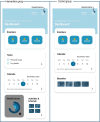A digitally supported multimodal lifestyle program to promote brain health among older adults (the LETHE randomized controlled feasibility trial): study design, progress, and first results
- PMID: 39574193
- PMCID: PMC11580696
- DOI: 10.1186/s13195-024-01615-4
A digitally supported multimodal lifestyle program to promote brain health among older adults (the LETHE randomized controlled feasibility trial): study design, progress, and first results
Abstract
Background: The Finnish Geriatric Intervention Study to Prevent Cognitive Impairment and Disability (FINGER) multimodal lifestyle intervention yielded cognitive and other health benefits in older adults at risk of cognitive decline. The two-year multinational randomized controlled LETHE trial evaluates the feasibility of a digitally supported, adapted FINGER intervention among at-risk older adults. Technology is used to complement in-person activities, streamline the intervention delivery, personalize recommendations, and collect digital biomarkers.
Methods: Trial includes older adults (60-77 years) with digital readiness/experience with smart devices and increased dementia risk but without substantial cognitive impairment. Participants are enrolled at four sites (Austria, Finland, Italy, Sweden). At baseline, participants were randomized 1:1 ratio to 1) intervention i.e., structured multimodal lifestyle program (including diet, exercise, cognitive training, vascular/metabolic risk management, social stimulation, sleep/stress management) where in-person activities led by professionals are supported with an Android mobile phone application developed by the consortium (the LETHE App); or 2) control i.e., self-guided program (regular health advice; simplified App with no personalized/interactive content). All participants wear smartwatches to gather passive data (e.g., physical activity, sleep). Primary outcomes are retention, adherence, and change in validated dementia risk scores. Secondary outcomes include changes in lifestyle, cognition, stress, sleep, health-related quality of life, and health literacy. Additional outcomes (exploratory) include e.g. participant experiences and dementia-related biomarkers (Alzheimer's disease blood markers, neuroimaging). A sub-study explores the feasibility of novel interactive technology (audio glasses, social robot).
Results: Recruitment began in September 2022, and the last participant was randomized in June 2023. In total, 156 individuals were randomized (mean age 69 years, 65% women; balanced recruitment across the four sites). Vascular and lifestyle risk factors were common (e.g., 65% with hypertension, 69% with hypercholesterolemia, 39% physically inactive), indicating successful recruitment of a population with risk reduction potential. Trial will be completed by summer 2025. Retention until the first post-baseline visit at 6 months is high (n = 2 discontinued, retention 98.7%).
Conclusion: LETHE provides crucial information about the feasibility of technology and a digitally supported FINGER lifestyle program to promote brain health. Digital tools specifically designed for older adults could offer potential for large-scale, cost-effective prevention programs.
Trial registration: ClinicalTrials.gov (NCT05565170).
Keywords: Cognitive decline; Dementia; Prevention; Randomized controlled trial; Risk reduction; Technology; eHealth; mHealth.
© 2024. The Author(s).
Conflict of interest statement
Declarations. Ethics approval and consent to participate: The trial has been approved by ethical committees in Austria (Ethics Committee of the Medical University of Vienna, 1392/2022), Finland (Helsinki and Uusimaa Hospital District Ethical Committee, HUS/13675/2022, statement 22/2023), Italy (Regional Ethics Committee—CER Umbria, 27604/23/ESS), and Sweden (Swedish Ethical Review Authority, 2023–05110-02). All participants provided informed consent prior to enrollment. Consent for publication: Not applicable. Competing interests: HU, AG, MB, JB, BBS, RC, AD, DF, HH, SiH, TK, JeL, VL, CT, StH, FM, PM, ES, TN declare that they have no competing interests. AR and MK are Editors of Alzheimer’s Research & Therapy. MC and MP are employed by Innovation2Grow. NK is employed by Kaasa Solution GmbH. JyL is employed by and a stakeholder at Combinostics Ltd.
Figures
References
-
- World Health Organization. Risk reduction of cognitive decline and dementia: WHO guidelines. Geneva. 2019. Available from: https://www.who.int/publications/i/item/9789241550543. Accessed 21 Nov 2023. - PubMed
-
- Long S, Benoist C, Weidner W. World Alzheimer Report 2023: Reducing dementia risk: never too early, never too late. London: England; 2023.
-
- Kivipelto M, Mangialasche F, Ngandu T. Lifestyle interventions to prevent cognitive impairment, dementia and Alzheimer disease. Nat Rev Neurol. 2018;14(11):653–66. - PubMed
-
- Barbera M, Perera D, Matton A, Mangialasche F, Rosenberg A, Middleton L, et al. Multimodal Precision Prevention - A New Direction in Alzheimer’s Disease. J Prevent Alzheimer’s Dis. 2023;10(4):718–28. - PubMed
Publication types
MeSH terms
Associated data
Grants and funding
- 101017405/Horizon 2020 Framework Programme
- 101017405/Horizon 2020 Framework Programme
- 101017405/Horizon 2020 Framework Programme
- 101017405/Horizon 2020 Framework Programme
- 101017405/Horizon 2020 Framework Programme
- 101017405/Horizon 2020 Framework Programme
- 101017405/Horizon 2020 Framework Programme
- 101017405/Horizon 2020 Framework Programme
- 101017405/Horizon 2020 Framework Programme
- 101017405/Horizon 2020 Framework Programme
- 101017405/Horizon 2020 Framework Programme
- 101017405/Horizon 2020 Framework Programme
- 101017405/Horizon 2020 Framework Programme
- 101017405/Horizon 2020 Framework Programme
- 101017405/Horizon 2020 Framework Programme
- 101017405/Horizon 2020 Framework Programme
- 101017405/Horizon 2020 Framework Programme
- 101017405/Horizon 2020 Framework Programme
- 101017405/Horizon 2020 Framework Programme
- 101017405/Horizon 2020 Framework Programme
- 101017405/Horizon 2020 Framework Programme
- 101017405/Horizon 2020 Framework Programme
- 101017405/Horizon 2020 Framework Programme
- 101017405/Horizon 2020 Framework Programme
- 101017405/Horizon 2020 Framework Programme
- 101017405/Horizon 2020 Framework Programme
- 2023-01125/Forskningsrådet om Hälsa, Arbetsliv och Välfärd
- 2023-01125/Forskningsrådet om Hälsa, Arbetsliv och Välfärd
LinkOut - more resources
Full Text Sources
Medical




